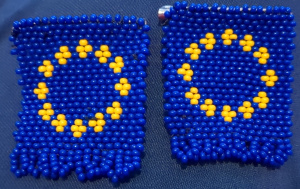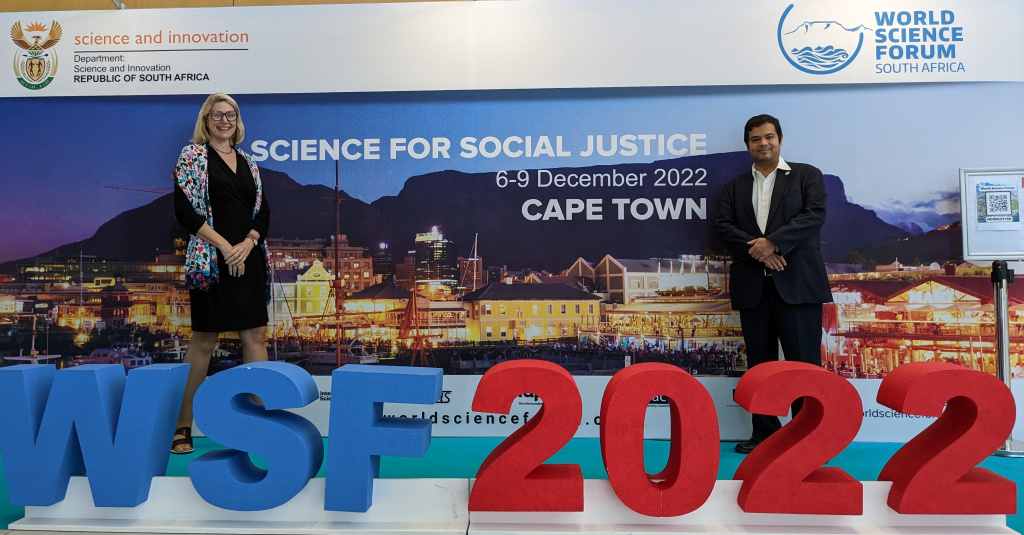WSF 2022: “Science and Social Justice, to inspire a greater commitment to global collaboration and solidarity”


Alliance members presented at the World Science Forum (5-9 Dec. 22 in Cape Town RSA): “Science for Social Justice”. Incoming co-chair Mostafa Shawrav (MCAA) organized a side session entitled “Science Policy Advice to tackle societal challenges” well attended by ~40 persons from Africa, Malaysia, and across the globe. Former Alliance co-chair Claire Mays (Symlog) presented case studies of particular interest to the Global South from the Horizon 2020 funded InsSciDE.eu Open Access book, focussing on unanticipated relationships between scientists and policy actors. Panelists included L. Borrell-Damián (Science Europe), J. MacKenzie (AAAS) and M. Muchie (Tshwane U. of Technology), the latter bringing in the concept of Ubuntu – “I am because we are” – which permeated the entire Forum (photos). Mostafa’s skilled moderation brought audience discussion to touch on e.g. use and abuse of scientists by policy makers, bases for policy that lie outside evidence, decolonization of science, and the unexamined racialization of policy through data algorithms that ignore minority realities. We may anticipate future applications from potential Alliance Global Networking Partners after this session.

Day 3 afternoon of the Forum centered on Science Diplomacy with brilliant keynotes by ISC president Sir P. Gluckman and South Africa’s Minister of International Relations and Cooperation Dr Naledi Pandor. Alliance members then spoke in plenary in a session convened by GESDA and SciTech DiploHub in partnership with the new organization SDCfA (SD Capital for Africa), and headlined by F.D. Dakora, president of the African Academy of Sciences. The provocative questions by moderator Prof. H. Soodyall (Academy of Science of South Africa) and the audience as to what good Science Diplomacy can do were met with aplomb by Marga Gual (SciDip Int’l as well as GESDA), Alexis Roig (SciTech DiploHub), and Jan-Marco Müller (EC – Advisory Partner). They shared highly actionable advice on organizing SD capacity and sustainable collaboration in multi-actor ecosystems; serving science diasporas; supporting the African STI agenda as well as innovators' win-win contributions to international relations; and bringing science advice to the fore in the full range of policy decisions (photos).
Peter McGrath (UNESCO-TWAS – Global Networking Partner) ran an important session on aiding refugee scientists (photos), informed by a joint action with the Global Young Academy. (As secretary of the InterAcademy Partnership, Peter et col. further ensured that a GYA representative sat on each plenary panel throughout the Forum, a welcome initiative.)
Overall the World Science Forum was a dynamic transhemispheric encounter between natural, physical, and human/social scientists (early career to very senior), and policy actors (idem – including President C. Ramaphosa of the Republic of South Africa). “Science for Social Justice” was plumbed by dozens of participative sessions examining data and ideas spanning social, academic, gender, economic, environmental, and political equity. Faultlessly organized by Daan du Toit and his staff from South Africa’s Department of Science and Innovation (@dsigovza), the Forum was intellectually exciting and warmly hospitable. The welcome by African scholars, activists, innovators, politicians, and administrators to their global peers was beyond cordial; it was hope inspiring. The Alliance can ratify with confidence the statement included in the Declaration adopted at the close of WSF 2022: “We acknowledge and celebrate the excellence and achievements of African science as a resource for humanity”.
Claire Mays, Cape Town 15 December 2022